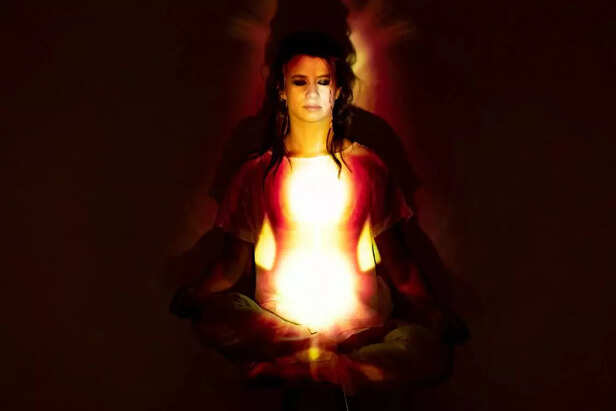You’re Not Sad—You’re Feeling Sad: The Gita on Why Emotions Are Separate From You
Nidhi | Mar 13, 2025, 13:07 IST
( Image credit : Times Life Bureau, Timeslife )
This article explores the Bhagavad Gita’s profound teaching that you are not your emotions. While feelings like sadness and joy are temporary, your true self remains unchanged. By understanding this separation, the Gita guides us toward emotional resilience, inner peace, and a deeper connection with our authentic self.
"न त्वं देहो न ते देहो ज्ञाता ज्ञेयं च नात्मनि।
अज्ञानादेतदित्याहुः ज्ञानेनैव परिक्षयः॥"
— Bhagavad Gita (Chapter 13, Verse 31)*
"You are not the body, nor does the body belong to you.
You are neither the doer nor the experiencer.
This illusion arises from ignorance—
And dissolves only through true knowledge."
When you say, “I am sad,” you’re doing more than expressing an emotion—you’re tying it to your identity. The Bhagavad Gita challenges this perception at its core: you are not your mind, not your body, and certainly not your passing emotions.
Sadness, anger, joy—these are fleeting states of mind. They are experiences, not definitions of who you are. Your true self (atman) is untouched by these emotional storms. Just as the sky remains unchanged while clouds pass by, your inner self remains steady beneath the rise and fall of emotions.
Krishna’s message to Arjuna in the Gita is simple yet profound: You are not your thoughts; you are the awareness behind them. Let’s explore how this understanding can transform how you experience emotions.

"वेदाविनाशिनं नित्यं य एनमजमव्ययम्।
कथं स पुरुषः पार्थ कं घातयति हन्ति कम्॥"
(Veda vināśhinam nityaṁ ya enam ajam avyayam;
Kathaṁ sa puruṣhaḥ pārtha kaṁ ghātayati hanti kam.)
— Bhagavad Gita (Chapter 2, Verse 21)*
"One who knows the soul to be indestructible, eternal, unborn, and unchanging—
How can that person kill or cause another to kill?"
The Gita teaches that the soul (atman) is eternal and unaffected by the material world. Emotions like sadness, anger, and anxiety arise from the mind, not the soul.
When you say “I am sad,” you are mistakenly identifying your emotional state with your eternal self. But emotions are like waves—they rise and fall—but the ocean (your soul) remains unchanged.
Instead of saying, “I am sad,” say:
the emotion and instead become the observer of it.

"मात्रास्पर्शास्तु कौन्तेय शीतोष्णसुखदुःखदाः।
आगमापायिनोऽनित्यास्तांस्तितिक्षस्व भारत॥"
(Mātrā-sparśhās tu kaunteya śhītoṣhṇa-sukha-duḥkha-dāḥ;
Āgamāpāyino’nityās tāṁs titikṣhasva bhārata.)
— Bhagavad Gita (Chapter 2, Verse 14)*
"O son of Kunti, the contact between the senses and the sense objects
Gives rise to feelings of cold and heat, pleasure and pain.
These are temporary and fleeting—endure them patiently."
Krishna reminds Arjuna that emotions are like changing seasons—they are temporary and ever-shifting. Just as winter gives way to spring, sadness and happiness come and go.
When you experience sadness, remind yourself:

"प्रकृतेः क्रियमाणानि गुणैः कर्माणि सर्वशः।
अहङ्कारविमूढात्मा कर्ताहमिति मन्यते॥"
(Prakṛiteḥ kriyamāṇāni guṇaiḥ karmāṇi sarvaśhaḥ;
Ahaṅkāra-vimūḍhātmā kartāham iti manyate.)
— Bhagavad Gita (Chapter 3, Verse 27)*
"All actions are performed by the modes of material nature.
But the deluded self, influenced by ego,
Thinks, ‘I am the doer.’"
Emotions arise from the interplay of mind and senses, but the self remains separate from them. When you identify with emotions, you create suffering.
Instead of reacting impulsively, step back and observe:

"योगस्थः कुरु कर्माणि सङ्गं त्यक्त्वा धनञ्जय।
सिद्ध्यसिद्ध्योः समो भूत्वा समत्वं योग उच्यते॥"
(Yogasthaḥ kuru karmāṇi saṅgaṁ tyaktvā dhanañjaya;
Siddhy-asiddhyoḥ samo bhūtvā samatvaṁ yoga uchyate.)
— Bhagavad Gita (Chapter 2, Verse 48)*
"Be steadfast in the practice of yoga, O Arjuna.
Perform your duties without attachment to success or failure.
Equanimity in success and failure is the true definition of yoga."
Sadness often arises from attachment—attachment to success, relationships, or expectations. Krishna advises detachment not as indifference, but as balance.
Instead of resisting sadness or trying to escape it, allow it to arise and pass naturally. Respond to it without becoming consumed by it.

"उद्धरेदात्मनात्मानं नात्मानमवसादयेत्।
आत्मैव ह्यात्मनो बन्धुरात्मैव रिपुरात्मनः॥"
(Uddhared ātmanātmānaṁ nātmānam avasādayet;
Ātmaiva hyātmano bandhur ātmaiva ripur ātmanaḥ.)
— Bhagavad Gita (Chapter 6, Verse 5)*
"Elevate yourself through the power of your mind;
Do not degrade yourself.
For the mind can be your friend or your enemy."
Self-awareness creates distance between you and your emotions. When you realize you are not the emotion but the observer, you reclaim your inner peace.
Ask yourself:
Instead of saying:
The Gita teaches that you are not sadness or happiness. You are the awareness beneath it all—the eternal observer. Like waves in the ocean, emotions will rise and fall—but the ocean remains untouched.
And that ocean is you.
अज्ञानादेतदित्याहुः ज्ञानेनैव परिक्षयः॥"
— Bhagavad Gita (Chapter 13, Verse 31)*
"You are not the body, nor does the body belong to you.
You are neither the doer nor the experiencer.
This illusion arises from ignorance—
And dissolves only through true knowledge."
The Gita’s Wisdom on Separating Your True Self from Your Emotions
Sadness, anger, joy—these are fleeting states of mind. They are experiences, not definitions of who you are. Your true self (atman) is untouched by these emotional storms. Just as the sky remains unchanged while clouds pass by, your inner self remains steady beneath the rise and fall of emotions.
Krishna’s message to Arjuna in the Gita is simple yet profound: You are not your thoughts; you are the awareness behind them. Let’s explore how this understanding can transform how you experience emotions.
1. You Are the Soul, Not the Emotion

Krishna - Arjuna
( Image credit : Times Life Bureau )
"वेदाविनाशिनं नित्यं य एनमजमव्ययम्।
कथं स पुरुषः पार्थ कं घातयति हन्ति कम्॥"
(Veda vināśhinam nityaṁ ya enam ajam avyayam;
Kathaṁ sa puruṣhaḥ pārtha kaṁ ghātayati hanti kam.)
— Bhagavad Gita (Chapter 2, Verse 21)*
"One who knows the soul to be indestructible, eternal, unborn, and unchanging—
How can that person kill or cause another to kill?"
The Gita teaches that the soul (atman) is eternal and unaffected by the material world. Emotions like sadness, anger, and anxiety arise from the mind, not the soul.
When you say “I am sad,” you are mistakenly identifying your emotional state with your eternal self. But emotions are like waves—they rise and fall—but the ocean (your soul) remains unchanged.
Instead of saying, “I am sad,” say:
- “I am noticing sadness.”
- “Sadness is present right now.”
the emotion and instead become the observer of it.
2. Emotions Are Temporary, Your True Self Is Eternal

Soul is Eternal
( Image credit : Pexels )
"मात्रास्पर्शास्तु कौन्तेय शीतोष्णसुखदुःखदाः।
आगमापायिनोऽनित्यास्तांस्तितिक्षस्व भारत॥"
(Mātrā-sparśhās tu kaunteya śhītoṣhṇa-sukha-duḥkha-dāḥ;
Āgamāpāyino’nityās tāṁs titikṣhasva bhārata.)
— Bhagavad Gita (Chapter 2, Verse 14)*
"O son of Kunti, the contact between the senses and the sense objects
Gives rise to feelings of cold and heat, pleasure and pain.
These are temporary and fleeting—endure them patiently."
Krishna reminds Arjuna that emotions are like changing seasons—they are temporary and ever-shifting. Just as winter gives way to spring, sadness and happiness come and go.
When you experience sadness, remind yourself:
- “This is temporary.”
- “My true self remains unchanged.”
3. You Are the Observer, Not the Doer

Observe
( Image credit : Pexels )
"प्रकृतेः क्रियमाणानि गुणैः कर्माणि सर्वशः।
अहङ्कारविमूढात्मा कर्ताहमिति मन्यते॥"
(Prakṛiteḥ kriyamāṇāni guṇaiḥ karmāṇi sarvaśhaḥ;
Ahaṅkāra-vimūḍhātmā kartāham iti manyate.)
— Bhagavad Gita (Chapter 3, Verse 27)*
"All actions are performed by the modes of material nature.
But the deluded self, influenced by ego,
Thinks, ‘I am the doer.’"
Emotions arise from the interplay of mind and senses, but the self remains separate from them. When you identify with emotions, you create suffering.
Instead of reacting impulsively, step back and observe:
- “What is this emotion trying to tell me?”
- “How can I respond rather than react?”
4. Let Go of Attachment to Outcomes

Let Go
( Image credit : Pexels )
"योगस्थः कुरु कर्माणि सङ्गं त्यक्त्वा धनञ्जय।
सिद्ध्यसिद्ध्योः समो भूत्वा समत्वं योग उच्यते॥"
(Yogasthaḥ kuru karmāṇi saṅgaṁ tyaktvā dhanañjaya;
Siddhy-asiddhyoḥ samo bhūtvā samatvaṁ yoga uchyate.)
— Bhagavad Gita (Chapter 2, Verse 48)*
"Be steadfast in the practice of yoga, O Arjuna.
Perform your duties without attachment to success or failure.
Equanimity in success and failure is the true definition of yoga."
Sadness often arises from attachment—attachment to success, relationships, or expectations. Krishna advises detachment not as indifference, but as balance.
Instead of resisting sadness or trying to escape it, allow it to arise and pass naturally. Respond to it without becoming consumed by it.
5. Self-Awareness Is the Path to Freedom

Freedom
( Image credit : Pexels )
"उद्धरेदात्मनात्मानं नात्मानमवसादयेत्।
आत्मैव ह्यात्मनो बन्धुरात्मैव रिपुरात्मनः॥"
(Uddhared ātmanātmānaṁ nātmānam avasādayet;
Ātmaiva hyātmano bandhur ātmaiva ripur ātmanaḥ.)
— Bhagavad Gita (Chapter 6, Verse 5)*
"Elevate yourself through the power of your mind;
Do not degrade yourself.
For the mind can be your friend or your enemy."
Self-awareness creates distance between you and your emotions. When you realize you are not the emotion but the observer, you reclaim your inner peace.
Ask yourself:
- “Is this feeling passing or permanent?”
- “Does this emotion define me?”
- “What is beneath this emotion?”
The Shift from “Being” to “Experiencing”
- “I am sad.” → “I am experiencing sadness.”
- “I am angry.” → “I am noticing anger.”
The Gita teaches that you are not sadness or happiness. You are the awareness beneath it all—the eternal observer. Like waves in the ocean, emotions will rise and fall—but the ocean remains untouched.
And that ocean is you.
